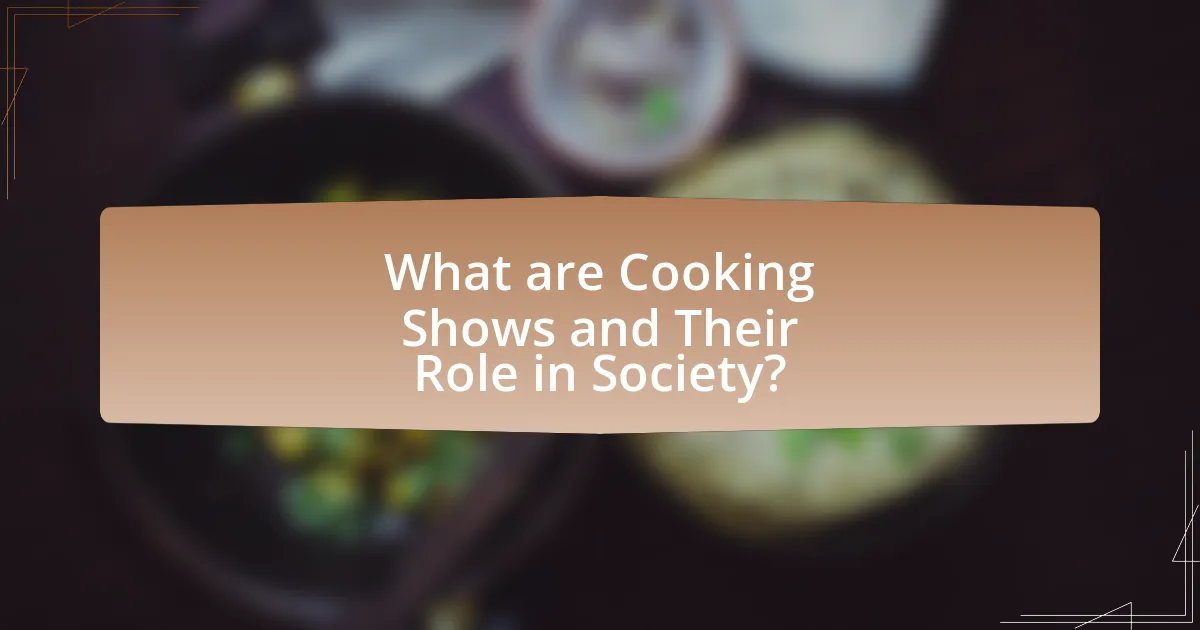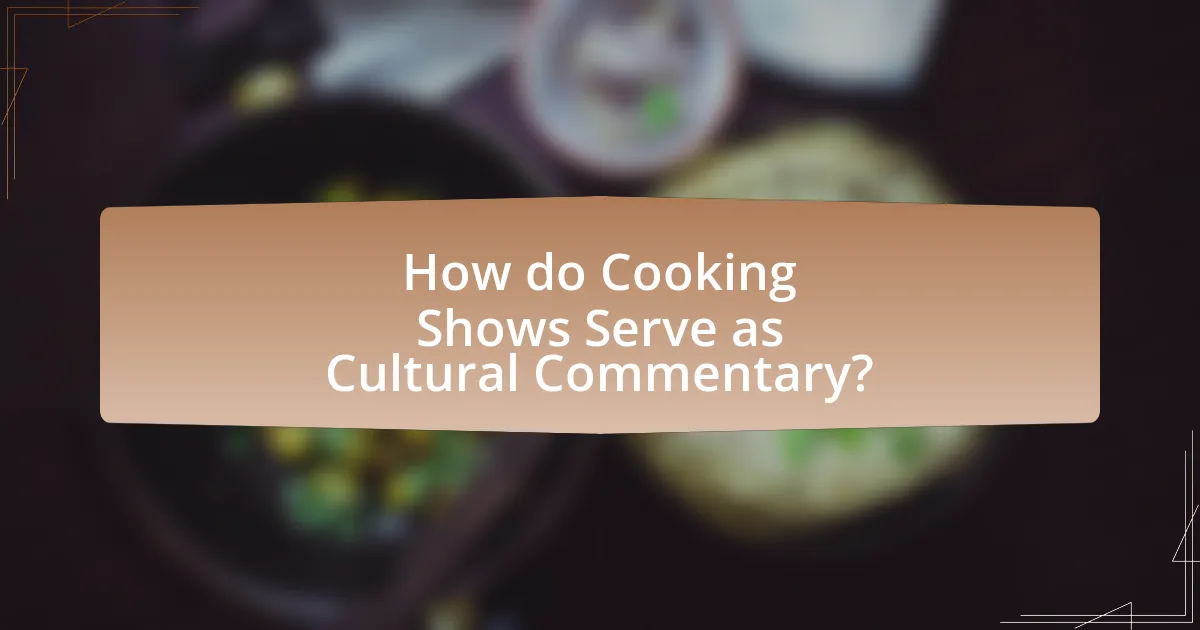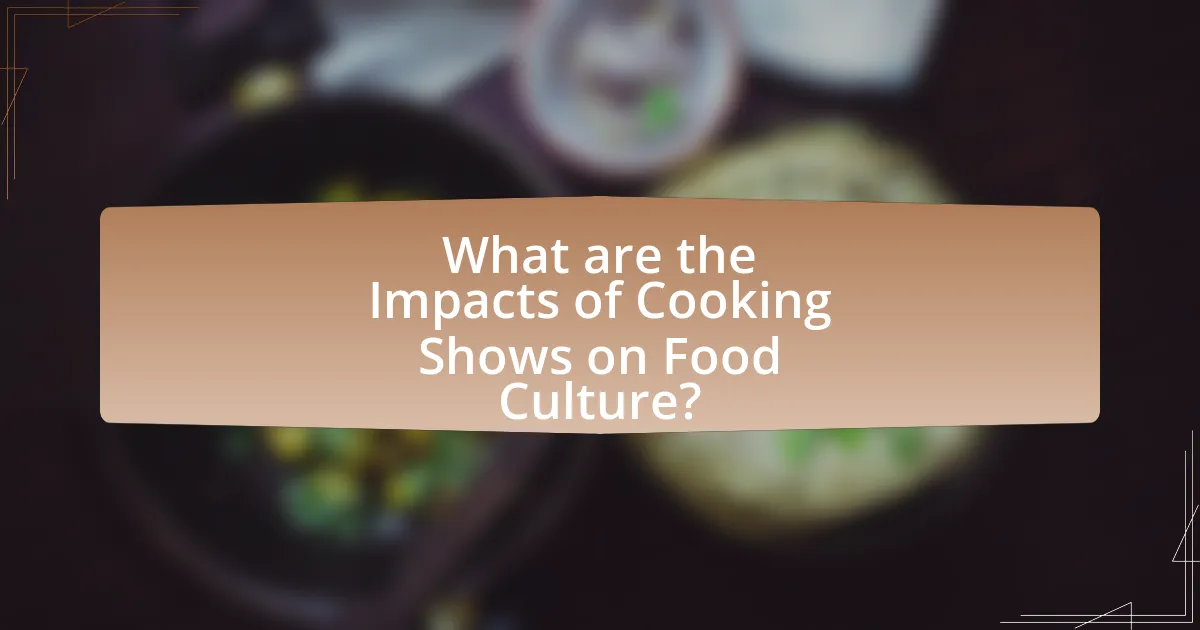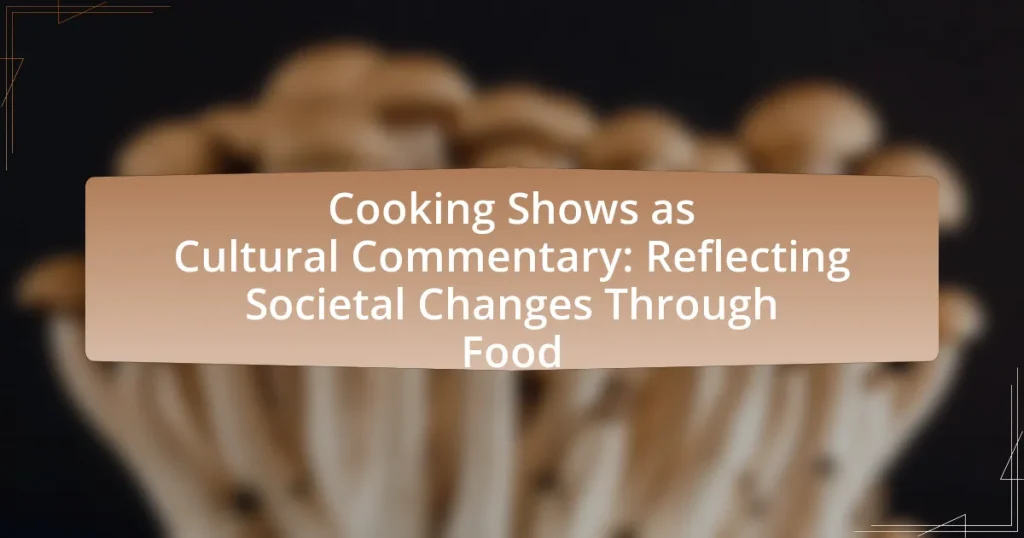Cooking shows are television programs that focus on food preparation and presentation, significantly influencing culinary trends, cultural exchange, and nutrition education. They reflect societal values by showcasing diverse cuisines and cooking techniques, while addressing themes such as health, sustainability, and social relationships. These shows serve as cultural commentary, highlighting issues like food justice and dietary preferences, and they engage audiences emotionally through relatable narratives. Additionally, cooking shows promote food literacy and practical cooking skills, impacting consumer behavior and encouraging healthier eating habits. Overall, they play a crucial role in shaping food culture and reflecting societal changes through the lens of culinary practices.

What are Cooking Shows and Their Role in Society?
Cooking shows are television programs that focus on the preparation and presentation of food, often featuring chefs or home cooks demonstrating recipes and cooking techniques. These shows play a significant role in society by influencing culinary trends, promoting cultural exchange, and educating viewers about nutrition and cooking skills. For instance, the rise of cooking shows has contributed to the popularity of diverse cuisines, showcasing dishes from various cultures and encouraging viewers to explore new flavors. Additionally, studies have shown that cooking shows can enhance food literacy, as they provide practical knowledge that empowers individuals to make healthier food choices.
How do Cooking Shows Reflect Cultural Values?
Cooking shows reflect cultural values by showcasing culinary traditions, social norms, and evolving food practices within a society. These programs often highlight regional ingredients, cooking techniques, and family recipes, which serve as a representation of cultural heritage and identity. For instance, shows that emphasize farm-to-table practices reflect a growing societal value placed on sustainability and local sourcing. Additionally, the inclusion of diverse cuisines in mainstream cooking shows illustrates the increasing acceptance and celebration of multiculturalism in society. This trend is supported by the rise of shows featuring chefs from various backgrounds, which promotes inclusivity and broadens viewers’ culinary perspectives.
What themes are commonly explored in Cooking Shows?
Cooking shows commonly explore themes such as cultural diversity, health and wellness, sustainability, and the impact of food on social relationships. Cultural diversity is highlighted through the presentation of various cuisines and cooking techniques from around the world, showcasing the richness of global culinary traditions. Health and wellness themes often focus on nutrition, dietary restrictions, and the promotion of healthy eating habits, reflecting societal trends towards better health. Sustainability is increasingly addressed, with shows emphasizing local sourcing, organic ingredients, and environmentally friendly practices. Additionally, the impact of food on social relationships is explored, illustrating how cooking and sharing meals can strengthen bonds among family and friends. These themes collectively serve as a lens through which societal changes and values are reflected in contemporary cooking shows.
How do Cooking Shows portray different cultural cuisines?
Cooking shows portray different cultural cuisines by showcasing traditional recipes, cooking techniques, and the cultural significance of food within various societies. These programs often feature chefs or home cooks who explain the origins and history of dishes, emphasizing the unique ingredients and methods that define each cuisine. For instance, shows like “Parts Unknown” hosted by Anthony Bourdain explore local food customs and their connections to cultural identity, illustrating how cuisine reflects societal values and traditions. Additionally, cooking competitions often highlight diverse culinary styles, promoting cross-cultural appreciation and understanding among viewers. This representation not only educates audiences about global cuisines but also fosters a sense of connection and respect for different cultures through the universal language of food.
Why are Cooking Shows Popular in Contemporary Media?
Cooking shows are popular in contemporary media because they engage audiences through entertainment, education, and cultural connection. These programs often blend culinary techniques with storytelling, allowing viewers to learn about diverse cuisines and cooking methods while enjoying visually appealing content. According to a 2021 Nielsen report, cooking shows have seen a significant increase in viewership, particularly during the pandemic, as people sought new hobbies and comfort through food. This surge reflects a broader societal trend where food serves as a medium for cultural expression and community bonding, making cooking shows a relevant and appealing form of entertainment.
What factors contribute to the rise of Cooking Shows?
The rise of cooking shows is primarily driven by the increasing popularity of food culture and the desire for accessible culinary education. As society becomes more health-conscious and interested in diverse cuisines, cooking shows provide entertainment while educating viewers on cooking techniques and recipes. Additionally, the influence of social media platforms, where food content is widely shared and celebrated, has amplified the visibility and appeal of cooking shows. According to a 2021 survey by the National Restaurant Association, 70% of consumers expressed interest in cooking at home, further validating the trend. This combination of cultural interest, educational value, and social media engagement has significantly contributed to the rise of cooking shows.
How do Cooking Shows engage with audiences emotionally?
Cooking shows engage with audiences emotionally by creating relatable narratives that resonate with viewers’ personal experiences and cultural backgrounds. These shows often feature contestants or hosts sharing their stories, struggles, and triumphs, which fosters a sense of connection and empathy among the audience. For instance, the use of family recipes or cultural dishes evokes nostalgia and pride, allowing viewers to reflect on their own culinary heritage. Additionally, cooking shows frequently incorporate elements of competition and collaboration, which can elicit excitement and tension, further enhancing emotional investment. Research indicates that emotional storytelling in media, including cooking shows, significantly increases viewer engagement and retention, as audiences are more likely to remember and connect with content that resonates on a personal level.

How do Cooking Shows Serve as Cultural Commentary?
Cooking shows serve as cultural commentary by reflecting societal values, trends, and changes through the lens of food preparation and consumption. These programs often highlight issues such as globalization, health consciousness, and social justice, showcasing diverse cuisines and cooking techniques that represent various cultural identities. For instance, shows that feature farm-to-table concepts emphasize sustainability and local sourcing, aligning with contemporary movements towards environmental awareness. Additionally, cooking competitions often reveal underlying social dynamics, such as class disparities and gender roles, by portraying contestants from different backgrounds and their culinary journeys. This representation allows viewers to engage with and critique societal norms, making cooking shows a powerful medium for cultural reflection and dialogue.
In what ways do Cooking Shows address Social Issues?
Cooking shows address social issues by highlighting topics such as food insecurity, cultural diversity, and health awareness. For instance, many cooking shows feature segments on sustainable cooking practices, which raise awareness about environmental concerns and promote responsible consumption. Additionally, shows often showcase diverse cuisines, fostering cultural appreciation and understanding among viewers. Programs like “MasterChef” and “Top Chef” have included challenges that focus on feeding the homeless or addressing dietary restrictions, thereby directly engaging with social issues. These examples illustrate how cooking shows serve as platforms for discussing and reflecting on societal changes through the lens of food.
How do Cooking Shows tackle topics like sustainability and health?
Cooking shows address sustainability and health by incorporating eco-friendly cooking practices and promoting nutritious ingredients. These programs often feature segments on sourcing local and organic produce, which supports sustainable agriculture and reduces carbon footprints. For instance, shows like “Farm to Table” emphasize the importance of using seasonal ingredients, thereby encouraging viewers to make environmentally conscious choices. Additionally, many cooking shows highlight health-conscious recipes that cater to dietary needs, such as plant-based meals, which are linked to lower rates of chronic diseases. Research indicates that cooking shows can influence viewers’ food choices, with a study published in the Journal of Nutrition Education and Behavior showing that exposure to healthy cooking content increases the likelihood of adopting healthier eating habits.
What role do Cooking Shows play in discussions about food justice?
Cooking shows play a significant role in discussions about food justice by raising awareness of food inequities and promoting diverse culinary traditions. These programs often highlight issues such as access to healthy ingredients, the impact of food deserts, and the importance of sustainable practices. For instance, shows that feature chefs from marginalized communities can showcase traditional recipes and cooking methods, thereby validating cultural identities and addressing systemic inequalities in the food system. Additionally, cooking shows can serve as platforms for advocacy, encouraging viewers to engage with local food movements and support policies that promote equitable access to food.
How do Cooking Shows Adapt to Changing Societal Norms?
Cooking shows adapt to changing societal norms by incorporating diverse cuisines, addressing health and sustainability issues, and reflecting social movements. For instance, many cooking shows now feature plant-based recipes in response to the growing demand for vegan and vegetarian options, highlighting a shift towards healthier eating habits. Additionally, shows increasingly showcase chefs from various cultural backgrounds, promoting inclusivity and representation, which aligns with societal calls for diversity. Furthermore, cooking programs often emphasize sustainable practices, such as reducing food waste, in line with environmental awareness trends. These adaptations demonstrate how cooking shows serve as a mirror to evolving societal values and preferences.
What shifts in representation can be seen in recent Cooking Shows?
Recent cooking shows have shifted towards more diverse representation, showcasing a broader range of cultures, cuisines, and chefs from various backgrounds. This change reflects a growing recognition of the importance of inclusivity in media, as evidenced by the increasing number of shows featuring chefs from underrepresented communities, such as women, people of color, and LGBTQ+ individuals. For instance, shows like “Top Chef” and “MasterChef” have highlighted contestants from diverse ethnic backgrounds, emphasizing their unique culinary traditions and stories. This trend not only enriches the viewing experience but also promotes cultural appreciation and understanding among audiences.
How do Cooking Shows respond to trends in dietary preferences?
Cooking shows respond to trends in dietary preferences by adapting their recipes and themes to reflect current consumer interests, such as plant-based diets, gluten-free options, and health-conscious cooking. For instance, the rise of veganism has led many cooking shows to feature plant-based recipes prominently, showcasing innovative ways to prepare meals without animal products. This shift is evidenced by the increasing number of cooking shows dedicated solely to vegan cuisine, such as “Vegan Cooking with Love,” which highlights the demand for meat alternatives. Additionally, cooking shows often collaborate with nutritionists and chefs who specialize in specific dietary trends, ensuring that the content is both relevant and appealing to viewers seeking healthier lifestyle choices.

What are the Impacts of Cooking Shows on Food Culture?
Cooking shows significantly influence food culture by shaping public perceptions of cuisine, cooking techniques, and dietary trends. They introduce diverse culinary practices and ingredients to a broad audience, often leading to increased interest in global cuisines. For instance, shows like “MasterChef” and “Top Chef” have popularized gourmet cooking and elevated the status of chefs, transforming them into celebrities. Additionally, cooking shows often emphasize health and sustainability, reflecting societal shifts towards organic and locally sourced ingredients. Research indicates that viewership of cooking shows correlates with increased cooking at home, as evidenced by a study published in the Journal of Nutrition Education and Behavior, which found that participants who watched cooking shows were more likely to prepare meals from scratch. This trend not only enhances culinary skills but also fosters a greater appreciation for food culture and its social implications.
How do Cooking Shows Influence Eating Habits?
Cooking shows influence eating habits by promoting specific cuisines, cooking techniques, and dietary trends. These programs often showcase diverse food options, encouraging viewers to try new ingredients and recipes, which can lead to changes in their meal choices. For instance, a study published in the journal “Appetite” found that exposure to cooking shows increased the likelihood of viewers adopting healthier eating patterns, as they became more aware of nutritional information and cooking methods. Additionally, cooking shows often highlight cultural dishes, fostering an appreciation for global cuisines and potentially altering viewers’ preferences towards more varied diets.
What trends in home cooking have emerged from popular Cooking Shows?
Trends in home cooking that have emerged from popular cooking shows include an increased focus on health-conscious recipes, the use of diverse global cuisines, and the rise of cooking as a form of entertainment. Health-conscious recipes have gained popularity as shows emphasize nutritious ingredients and cooking techniques that promote well-being. The incorporation of diverse global cuisines reflects a growing interest in cultural exploration through food, encouraging home cooks to experiment with international flavors and dishes. Additionally, cooking shows have transformed cooking into an engaging activity, with formats that blend competition and storytelling, making it a popular leisure pursuit. These trends are supported by viewership statistics indicating that cooking shows have significantly influenced home cooking habits, with many viewers reporting they try new recipes inspired by what they watch.
How do Cooking Shows affect consumer behavior in food markets?
Cooking shows significantly influence consumer behavior in food markets by shaping preferences and purchasing decisions. Viewers often develop a desire to replicate recipes and cooking techniques showcased on these programs, leading to increased sales of specific ingredients and kitchen tools featured. For instance, a study published in the Journal of Consumer Research found that exposure to cooking shows can enhance consumers’ interest in trying new foods and cuisines, resulting in a 20% increase in the purchase of exotic ingredients. Additionally, cooking shows often promote health-conscious eating, which can shift consumer demand towards organic and fresh produce, as evidenced by a 2018 Nielsen report indicating a rise in organic food sales correlating with popular cooking shows emphasizing healthy recipes.
What are the Educational Aspects of Cooking Shows?
Cooking shows serve as educational platforms by teaching culinary skills, promoting nutritional awareness, and fostering cultural appreciation. They provide viewers with step-by-step instructions on various cooking techniques, which can enhance practical cooking abilities. Additionally, many cooking shows emphasize the importance of healthy eating habits, often featuring segments on nutrition and ingredient selection. For instance, shows like “MasterChef” and “The Food Network Star” not only showcase recipes but also educate audiences about the origins of ingredients and the cultural significance of certain dishes, thereby enriching viewers’ understanding of global cuisines. This educational aspect is supported by research indicating that cooking shows can positively influence dietary choices and cooking confidence among viewers.
How do Cooking Shows teach culinary skills to viewers?
Cooking shows teach culinary skills to viewers by demonstrating techniques, providing step-by-step instructions, and showcasing a variety of recipes. These shows often feature professional chefs or skilled home cooks who explain the cooking process, including ingredient selection, preparation methods, and cooking times. For instance, shows like “MasterChef” and “The Great British Bake Off” not only present recipes but also emphasize the importance of culinary fundamentals such as knife skills, flavor pairing, and presentation. This educational approach allows viewers to replicate dishes at home, enhancing their cooking abilities and confidence in the kitchen.
What role do Cooking Shows play in promoting food literacy?
Cooking shows play a significant role in promoting food literacy by educating viewers about cooking techniques, ingredients, and nutrition. These programs often demonstrate how to prepare diverse dishes, which enhances culinary skills and encourages home cooking. For instance, studies have shown that cooking shows can increase knowledge about healthy eating and food preparation, leading to improved dietary choices among viewers. Additionally, cooking shows frequently highlight cultural cuisines, fostering an appreciation for food diversity and encouraging exploration of various culinary traditions. This educational aspect is crucial in combating food insecurity and promoting healthier lifestyles, as evidenced by research indicating that individuals who engage with cooking media are more likely to cook at home and make informed food choices.
What Practical Tips Can Viewers Learn from Cooking Shows?
Viewers can learn practical tips such as cooking techniques, ingredient substitutions, and meal planning strategies from cooking shows. Cooking shows often demonstrate various methods like sautéing, roasting, and baking, which viewers can replicate in their own kitchens. Additionally, these shows frequently provide alternatives for ingredients, helping viewers adapt recipes based on availability or dietary restrictions. Meal planning tips, including how to prep ingredients in advance and create balanced meals, are also commonly shared, making cooking more efficient and accessible. These practical insights are reinforced by the popularity of cooking shows, which have been shown to influence home cooking habits positively, as evidenced by surveys indicating that viewers often try new recipes and techniques after watching.










